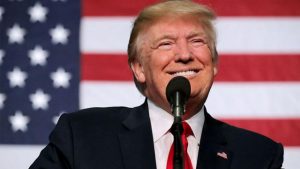 The Trump presidency is generally good for business, with tax cuts likely to boost profits at many companies, and some firms even offering their workers “Trump bonuses,” to share the windfall.
The Trump presidency is generally good for business, with tax cuts likely to boost profits at many companies, and some firms even offering their workers “Trump bonuses,” to share the windfall.
There’s one glaring exception: The marijuana business, which ought to be booming now that 8 states, including California, have declared weed legal for recreational use. Instead, Big Weed is suddenly reeling now that Trump’s attorney general, Jeff Sessions, has reversed an Obama-era policy of tolerating legal marijuana. The new policy could signal an unprecedented federal crackdown on pot, along with a titanic battle between several state governments and Washington.
Cannabis, the plant that produces marijuana, is still illegal under federal law, and Congress has shown no serious interest in changing that. So it was problematic when Colorado, Washington and other states began to declare pot legal for recreational use, starting in 2012. Federal law generally trumps state law, which meant the feds could essentially overturn state legalization laws, if they were willing to go through the messy legal process and political turmoil that would require.
President Obama settled the matter after his reelection in 2012, by saying federal prosecutors have “bigger fish to fry” than tangling with states over pot laws. The Justice Department formalized Obama’s “fish” policy in 2013, establishing guidelines that generally steered prosecutors away from marijuana cases. It’s worth noting that the Obama policy aligns with public attitudes toward marijuana, with 64% of Americans now saying they support the legalization of weed.
The Justice Department under Trump has a different view. Sessions, long an outspoken critic of legal weed, has rescinded the Obama guidelines, reopening the possibility that the Justice Department could go after growers, sellers or users in the 8 “legal” states. That doesn’t mean it will. But the threat of federal prosecution will slam the growth of the marijuana industry, because it’s hard to attract investment in a business the feds explicitly declare illegal.
[See how Sessions’ crackdown on pot could hurt Republicans in November.]
Legal marijuana is an $8 billion industry, with forecasts suggesting it could exceed $30 billion by 2021. That would still be a small industry, but potential growth rates of 3x to 4x over just a few years have begun to get investors’ attention.
Yet a Damocles sword now hangs over the industry, dampening its prospects. Even in the so-called legal states, pot has struggled to go mainstream because of that pesky federal prohibition. Pot businesses have trouble setting up regular bank accounts or taking out ordinary loans. Deep-pocketed corporations don’t want to back the industry, fearing a politicized mess should Washington intervene. The resulting hodgepodge slows the adoption of industry standards, consumer safeguards and efficiencies that would boost growth and profitability.
California’s legalization of pot, effective Jan. 1 of this year, might have normalized the whole industry, since its economy is so huge to start with and demand could soar. But normalization probably won’t happen now. Small operators will continue to grow and sell pot, figuring they’ll fly beneath the radar, should the feds pounce. Bigger companies will stay out, however, since they’d be likelier targets of aggressive prosecutors. There’s nothing wrong with a pot economy consisting mostly of small businesses, except that it will grow more slowly than an economy built on scale.
California and several other “legal” states could challenge Trump’s Justice Department in some way, especially if they have to defend their own residents against legal prosecution. But it’s hard to see how they’d prevail, given that federal law is clear: weed is illegal.
There are several obvious ironies (or, if you prefer, hypocrisies). Republicans repeatedly tout “states’ rights” while calling for a smaller federal footprint—yet on pot, Sessions is going out of his way to assert federal authority over state sovereignty. Trump also boasts of the myriad regulations he is killing, in order to free businesses from government interference. Yet his administration may now strangle the weed industry.
The simple fact, however, is that federal law declares marijuana illegal, and the attorney general’s job is to enforce federal law. States that want to legalize pot may feel Sessions has overstepped his authority. But it’s really those states that have done so, by declaring that federal law doesn’t apply to them. The black market for pot has a lot of life left in it.
